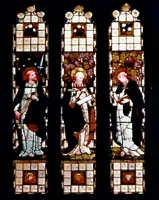Difference between revisions of "Synoptic Gospels"
(New page: Image:lighterstill.jpgright|frame The '''synoptic gospels''' are three gospels in the New Testament the Gospel of Matthew, the [[Gospel of M...) |
|||
| Line 1: | Line 1: | ||
[[Image:lighterstill.jpg]][[Image:Synoptic_(same_view).jpg|right|frame]] | [[Image:lighterstill.jpg]][[Image:Synoptic_(same_view).jpg|right|frame]] | ||
| + | |||
| + | |||
The '''synoptic gospels''' are three gospels in the [[New Testament]] the [[Gospel of Matthew]], the [[Gospel of Mark]], and the [[Gospel of Luke]], that display a high degree of similarity in [[content]], [[narrative]] arrangement, [[language]], and sentence and paragraph [[structure]]s. These gospels are also considered by Biblical scholars to share the same point of view. The fourth canonical Gospel, [[Gospel of John|John]], differs greatly from these three, as do the [[Apocryphal gospels]]. The synoptic gospels are the first three books of the canonical New Testament. The "synoptic problem" concerns the nature and origin of the literary relationship between these three accounts. | The '''synoptic gospels''' are three gospels in the [[New Testament]] the [[Gospel of Matthew]], the [[Gospel of Mark]], and the [[Gospel of Luke]], that display a high degree of similarity in [[content]], [[narrative]] arrangement, [[language]], and sentence and paragraph [[structure]]s. These gospels are also considered by Biblical scholars to share the same point of view. The fourth canonical Gospel, [[Gospel of John|John]], differs greatly from these three, as do the [[Apocryphal gospels]]. The synoptic gospels are the first three books of the canonical New Testament. The "synoptic problem" concerns the nature and origin of the literary relationship between these three accounts. | ||
| + | |||
| + | |||
| + | |||
== Dating == | == Dating == | ||
| + | |||
Scholars generally date the [[synoptic]] gospels as having been written after the epistles of [[Paul the Apostle|Paul]] and before the gospel according to John, thus between 60 and 115 AD. As to the specific dates for each [[book]], this largely depends on (or supports) the particular [[hypothesis]] used to account for the books' [[text]]ual relationship. | Scholars generally date the [[synoptic]] gospels as having been written after the epistles of [[Paul the Apostle|Paul]] and before the gospel according to John, thus between 60 and 115 AD. As to the specific dates for each [[book]], this largely depends on (or supports) the particular [[hypothesis]] used to account for the books' [[text]]ual relationship. | ||
Revision as of 16:37, 9 April 2009
The synoptic gospels are three gospels in the New Testament the Gospel of Matthew, the Gospel of Mark, and the Gospel of Luke, that display a high degree of similarity in content, narrative arrangement, language, and sentence and paragraph structures. These gospels are also considered by Biblical scholars to share the same point of view. The fourth canonical Gospel, John, differs greatly from these three, as do the Apocryphal gospels. The synoptic gospels are the first three books of the canonical New Testament. The "synoptic problem" concerns the nature and origin of the literary relationship between these three accounts.
Dating
Scholars generally date the synoptic gospels as having been written after the epistles of Paul and before the gospel according to John, thus between 60 and 115 AD. As to the specific dates for each book, this largely depends on (or supports) the particular hypothesis used to account for the books' textual relationship.
Polycarp who was a disciple of John, one of his student wrote that Polycarp taught Matthew wrote his Gospel first, Mark wrote Peter’s Teachings, Luke wrote Paul’s teachings and John wrote his last. Papias also a disciple of John’s confirms the order of the writing.
Clement I wrote that Mark wrote the teachings of Peter and when Peter learned of it, he gave it his blessing.
References
- "synoptic". Oxford English Dictionary. Oxford University Press. 2nd ed. 1989.
- "USCCB - NAB - John - Introduction". http://www.usccb.org/nab/bible/john/intro.htm. Retrieved on 2008-10-21.
- John 20:31 Template:Bibleverse-NIV
- http://www.jewishvirtuallibrary.org/jsource/Quote/hillel.html
- http://en.wikipedia.org/wiki/Hillel_the_Elder
- "Synoptic Problem Home Page". http://www.mindspring.com/~scarlson/synopt/. Retrieved on 2007-07-08.
- 1914: The New Testament from the Greek Text as Established by Bible Numerics. New Haven: Bible Numerics Co.
